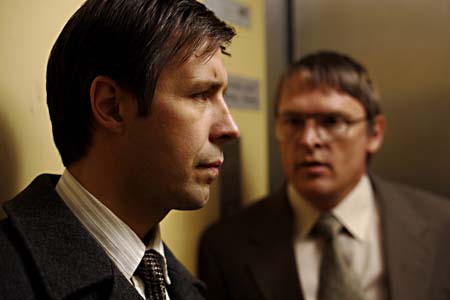RED RIDING: IN THE YEAR OF OUR LORD 1980
(director: James Marsh; screenwriters: from the novel by David Peace/Tony Grisoni; cinematographer: Igor Martinovic; editor: Jinx Godfrey; music: Dickon Hinchliffe; cast: Paddy Considine (Peter Hunter), Warren Clarke (Bill Molloy), James Fox (Philip Evans), Maxine Peake (Helen Marshall), Tony Pitts (John Nolan), David Morrisey (Maurice Jobson), Sean Harris (Bob Craven), Peter Mullan (Martin Laws), Tony Mooney (Tommy Douglas), David Calder (Sir John Marsden), Robert Sheehan (BJ), Jim Carter (Harold Angus), Lesley Sharp(Joan Hunter), Joseph Mawle (The Ripper); Runtime: 93; MPAA Rating: NR; producers: Andrew Eaton/Anita Overland/Wendy Brazington; IFC Films; 2009-UK)
“An amazing conceit.“
Reviewed by Dennis Schwartz
It was seen first in England onChannel 4 as a five-hour mini-series (seen by me in the States on the Sundance Channel), and is divided into three parts named after the years in which they take place—1974, 1980, and 1983. There are three different directors—Julian Jarrold (1974), Anand Tucker (1983) and for the middle version, the one reviewed, James Marsh (“Man on Wire”). This gives it three distinctly different looks. The weighty andv elegant screenplay is by Tony Grisoni, who adapts it from the Yorkshire-born writer David Peace’s novel (skipping the second volume to base this version on the third volume).
The first film was shot in blurry Super 16-millimeter film, while this version improves the visuals considerably with a glossy shooting in 35-millimeter film and by having the talented Igor Martinovic as its cinematographer.
The story revolves on the Home Office bringing into the investigation of the 13 unsolved Yorkshire murders the “crusading” Peter Hunter (Paddy Considine). He’s an outsider from Manchester brought in to conduct an internal review of the police investigation of the Yorkshire Ripper murders (true life cases, but the novel takes liberties with the facts and only offers a loose blueprint to the events), as the community is screaming mad at the police for bungling the investigation and making no arrests–and the newspapers are calling for an arrest. Peter is allowed to pick on his team two police officers who previously worked with him on the case, as he left the case a few years ago because his wife had a miscarriage. Peter chooses those he thinks he can trust, the efficient John Nolan (Tony Pitts) and the competent Helen Marshall (Maxine Peake), the attractive lady cop with whom he previously had an affair. The operation is based in Leeds, and the three undercover investigators stay in a hotel there.
Problems arise from the beginning, as Peter and the gruff Yorkshire police bosses – Maurice Jobson (David Morrissey), Harold Angus (Jim Carter), and Billy Molloy (Warren Clarke) offer no help. Also not helping matters is that the investigating group’s “liaison” with the regular officers, Bob Craven (Sean Harris), has things to hide and is not upfront with Hunter. The prior clumsy investigation of the serial killings points to inept snooping by the police and their interference with the investigation indicates there’s a massive cover-up. This leaves us wondering if there are any cops that we can trust, when even the clean cop Hunter also is covering up his unprofessional actions from the past.
The noirish thriller, though an amazing conceit in how it lays culpability of the brutal crimes to both the killer and the dark side of Yorkshire, is bogged down with the intricacies of the case, police speaking with heavy Yorkshire accents that foreigners like myself may have trouble understanding (could have used subtitles) and a poor editing job (things seemed too rushed). The so-called honest cop, Hunter, tries to navigate around his past sexual discretion, an unfriendly working relationship with the Yorkshire authorities and threats on his life by what seems to be colleagues on the force (including his house burned down in an arson attack). What eventually happens to him is haunting.
The cynical mantra of this down-and-dirty unconventional cop story trilogy is “This is the North, where we do what we want,” which is used to explain why it’s not that surprising this investigation was so botched by the close-knit Yorkshire police and that police corruption is so rampant.

REVIEWED ON 3/10/2011 GRADE: B https://dennisschwartzreviews.com/